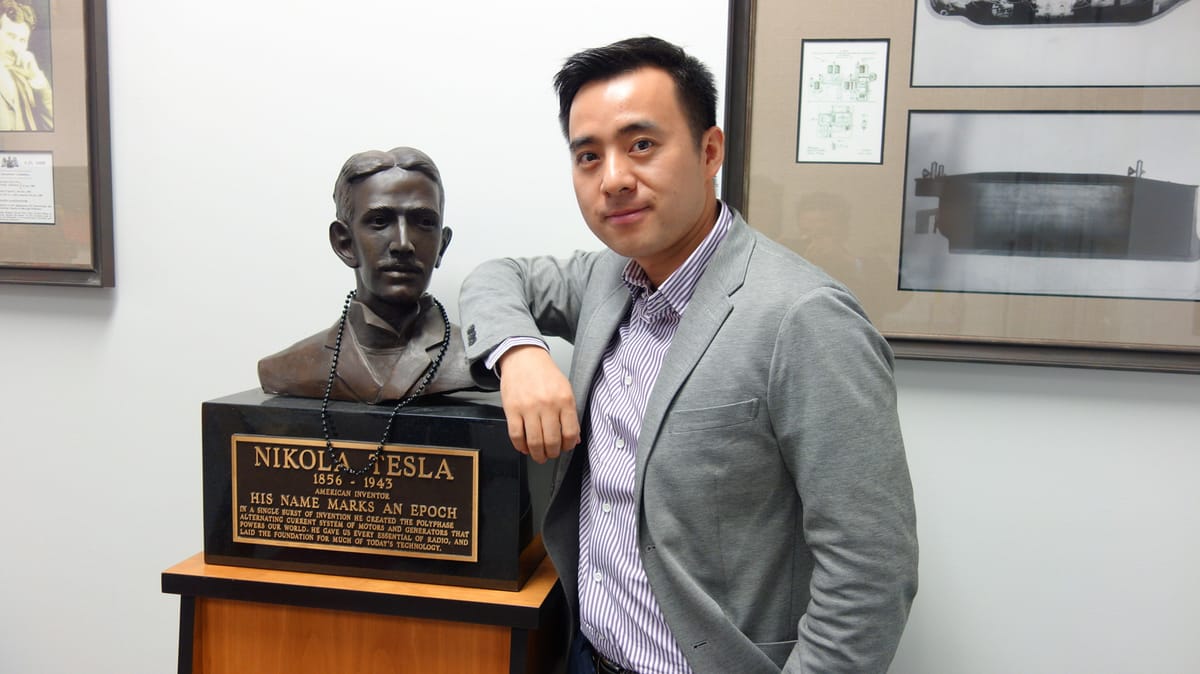The Poorest Angel Investor
A candid reflection on starting my angel investing journey with limited capital but unlimited passion for supporting entrepreneurs. Exploring how resourcefulness, network building, and strategic thinking can overcome financial constraints in early-stage investing.

A year ago, the idea of making an angel investment with a mere $15,000 USD seemed impossible to Leo Wang. Having resigned from a major company in 2007, he immersed himself in the burgeoning mobile Internet scene, organizing countless gatherings in Shanghai and Beijing, forging connections, but lacking a stable income. Yet, with almost all his cash deposits, he made that initial $15,000 investment. Today, this former Huawei employee, affectionately known as "Leo," is a shareholder in 50 mobile Internet startups, a testament to a groundbreaking investment philosophy he calls "PreAngel."
The PreAngel model is unique: an investment made even earlier than traditional angel rounds, with each commitment typically ranging from $10,000 to $15,000 USD (or 50,000 to 100,000 RMB) for a small stake, usually 2% or 3% equity. But Leo Wang offers more than just capital; he provides invaluable resources, from designing business models to introducing critical contacts, often acting as a co-founder for these nascent companies.
Initially, Leo playfully referred to himself as "the poorest angel investor," facing skepticism and even scorn. One entrepreneur, after being rejected, privately messaged him:
"If you don't have money, don't invest, fool!"
However, his track record over the past year has turned heads. Influential angel investors like Dayang, Mike Cai, and Green Pine Capital have recognized his foresight, providing him with $5 million USD to establish a new fund. As Leo himself once posted on his Weibo (China's equivalent of Twitter): "Every day I want to go to bed early and lie down at 11 o'clock, but it's 3 o'clock when I finish working every day, but I am still excited. I think I really love the career of angel investment so much!"
The Power of Connections: From Huawei to Mobile2.0
Leo Wang's journey to becoming a pioneering investor is deeply rooted in his early career and an innate ability to build networks.
He began his career in Huawei's business and software departments. While not considered "core" in a company primarily focused on communication equipment, this role provided him with a wealth of experience and, crucially, a vast network of connections.
In 2003, he transitioned to a Telecom Value Added Service Provider (SP) company. This period, which Leo describes as the "era of money grabbing and hidden deductions" in mobile Internet, exposed him to researching foreign new technologies and emerging WEB2.0 business models, including early players like Facebook and LinkedIn. Unfortunately, the underdeveloped mobile Internet environment in China at the time hindered the implementation of many of his innovative ideas.
His entrepreneurial spirit then led him to Chipnuts, a mobile phone chip company. By July 2007, he resigned again, embarking on his own SNS project. This venture, however, ultimately failed. This failure, while a setback, provided a profound insight: the significant hurdles entrepreneurs faced in securing angel round funding in China. He recalled exchanging 20% of his project's shares for a mere $30,000 USD loan, a struggle that highlighted a critical gap in the domestic investment landscape.
The Mobile2.0 Forum: An Accidental Catalyst
The true turning point came with the Mobile2.0 Forum, an initiative born purely out of his desire to help friends. After his SNS project failed, his extensive network frequently sought his assistance in connecting with various resources.
"One day I suddenly received many phone calls, asking me to introduce this person to that person, so I said I would just hold a party in the evening. Come on, call everyone out."
This casual gathering of over 20 people in a bar became the prototype for the Mobile2.0 Forum. The first official forum in October 2007, focusing on the then-nascent Android operating system and featuring Google China's Android business head Andy Tian, garnered immense popularity.
From 2007 to 2010, Leo dedicated himself to organizing these forums, covering diverse mobile Internet branches such as mobile games, advertising, and SNS. This period coincided with the mobile Internet's explosion into a global entrepreneurial hotspot, and the Mobile2.0 Forums became packed events, solidifying Leo's reputation and expanding his network exponentially across:
- Operators
- Mobile phone manufacturers
- Chip manufacturers
- SP companies
- Large Internet companies
- Mobile Internet entrepreneurs
During this "thinking" phase, he occasionally consulted for major corporations like MediaTek and Qualcomm, and frequently advised entrepreneurs without charge. This "unintentional help"—designing business models and introducing resources—later proved to be a goldmine, as over 10 startups he assisted spontaneously offered him stock options, including future well-known names like CamCard, ShangMail, and VIVA Reading.
Forging the "PreAngel" Business Model
The passive acquisition of options, while beneficial, lacked the security and active involvement Leo desired. This prompted him to transition from helping for free to formalizing an active investment strategy.
In early 2011, Leo made his first official investment in Gurudigger, an engineer community akin to a professional social network. After meeting the team, he proposed a novel investment approach via email:
- Focus on very early-stage products.
- Invest small amounts in each team.
- Acquire minimal shares.
- Leverage his resources to help teams expand.
Gurudigger became the inaugural project for what would soon be known as the PreAngel fund. Leo personally invested $15,000 USD, securing just 2% of the shares – a sum that represented almost his entire cash reserves at the time. The synergy was immediate, and the concept resonated. Friends, witnessing this, encouraged him to formalize the model, pooling resources to invest in a portfolio of similar companies.
More Than Money: The Co-founder Role
For most startups, the small capital infusion isn't the primary draw; it's Leo's extensive resources and hands-on involvement. He effectively acts as a co-founder, providing critical support in areas such as:
- Defining strategic direction
- Product design and development
- Securing next-round investment
- Facilitating partnerships with industry giants
- Talent acquisition
- Marketing, media, and public relations
This formalized "Pre-Angel" model involved a group of friends contributing 1 million yuan (approximately $150,000 USD at the time) to invest in 10 to 15 companies, each time taking a small 2% or 3% stake. Leo emphasized the distinction from free options:
"First of all, I have invested real money in cash, so in theory I have the right to cash out at any time. Then, I have to participate in the company's major decisions, and I have to sign contract. In addition, my name needs to be included in the government registration papers, so that rights and interests are protected by law."
A High-Volume, High-Touch Portfolio
Within a single year, Leo invested in approximately 50 mobile Internet projects. His portfolio includes diverse startups like:
- Lewa (Android operating system)
- Moqu (music streaming)
- Weijing (social app)
- Travel Tao (travel services)
- Touch View (interactive advertising)
- Kuaishuo (voice social)
- Tianlaiyin (audio content)
- Yike (lifestyle services)
- Julu Mobile (mobile marketing)
- Time Stream (productivity)
- Time Difference Network (travel social)
- Car Booking Network (transportation)
Due to the sheer volume, his investment process is rapid, often deciding after only an hour or two of conversation, with minimal due diligence. Leo's philosophy is clear: "early investment is an investment in people." He believes that if you invest in the right person, even if their initial project falters, you can still support their subsequent ventures. Consequently, projects from trusted old friends or those recommended by them are often his most reliable bets.
The success of Lewa, an Android operating system startup, stands out. Leo's $15,000 USD investment (100,000 yuan) in April 2011 for a 2% stake yielded a book return exceeding $600,000 USD (4 million yuan) after Lewa secured strategic investment from Tencent and Green Pine Capital. This single success effectively recovered almost all of the $650,000 USD (4 million yuan) total capital invested across his entire portfolio. However, not all projects thrive, with 3 or 4 ventures having failed or been abandoned.
Managing 50 projects demands immense energy. Leo employs a "passive management" approach, primarily stepping in when teams encounter significant difficulties. Even so, he often faces challenging situations:
- Team A runs out of money and requests a loan.
- Team B and C have disputes while collaborating, seeking his mediation.
- Team D accuses Team E of poaching employees.
- A publicly listed company F, introduced by Leo, intends to invest in his portfolio company G, but the terms prohibit G from cooperating with another listed company H, also a contact of Leo's.
Unearthing Opportunities: Traditional Industries Meet Mobile Internet
After his experience with 50 projects, Leo Wang has identified the biggest opportunity for the mobile Internet: the upgrading and transformation of traditional industries. He sees vast potential in almost every conventional field, including:
- Education
- Medical care
- Fitness
- Beauty
- Catering
- Car rental
- Real estate
- Tourism
Beyond identifying the space, finding the right entrepreneur – someone who genuinely understands their vision – is paramount. Leo observes a common pitfall among entrepreneurs:
"Many entrepreneurs believe that starting a business is about telling a story, raising money and then going public. Their typical approach is to go to the United States to copy a proven business model, attract a group of users, and then hold rounds of meetings with investors to tell stories and raise funds... The result is, many entrepreneurs forget the essence of business from the beginning."
For Leo, "Entrepreneurship is about doing business." He prioritizes investment projects with a clear business model from the outset. Many of these involve traditional industries, such as helping restaurants or gyms increase customer traffic, making it easier for them to generate revenue and ensure survival.
In China, the dominance of Internet giants like Tencent and Baidu in user-intensive fields creates a challenging landscape. As a metaphor, an entrepreneur directly competing with these "top boxing masters" often gets "beaten to a bloody head." Leo advocates for a "second best" approach:
"But in a village where you don't know how to practice martial arts, as long as you can punch two punches, you are a master of boxing. The most powerful people will be respected by people."
This strategy involves targeting niche areas overlooked by the giants, transforming traditional sectors like:
- Massage industry
- Catering industry
- Barbecue industry
- Breakfast industry
- Hairdressing industry
- Housekeeping industry
- Flower delivery industry
- Textile industry
- Adult products industry
- Modern breeding industry
- Organic fruits and vegetables industry
- Personal care industry
- Car repair industry
Leo firmly believes in the substantial business opportunities within these domains. "Many people say that the mobile Internet is sluggish this year, but I see opportunities everywhere." His vision involves disaggregating platforms like Dianping.com into specialized verticals, each capable of spawning a large, successful company.
The Evolution: PreAngel Fund and the Role of Luck
Leo Wang's acute judgment of the mobile Internet landscape has earned him the trust and backing of major investors. Not long ago, Dayang, Cai Wensheng, and Green Pine Capital jointly invested $5 million USD to establish a new PreAngel fund.
This significant increase in fund magnitude naturally brings about changes in the investment model. The new fund outlines specific investment conditions:
- The maximum investment per company is $100,000 USD for 10% equity.
- Investment agreements will include clauses requiring projects to prioritize future refinancing from Green Pine Capital or Mike Cai for subsequent angel rounds, ensuring alignment with the fund's Limited Partners (LPs).
Despite his strategic insights and tireless efforts, Leo Wang offers a humble conclusion on the nature of early-stage investing:
"I have concluded that investment and early-stage investment are at least 70% luck, and only 30% rely on your efforts. In the end, it is luck. The luck component is too important."
He emphasizes that the most crucial element in early investment is the right mindset: "If it succeeds, it will be done. If it doesn't, it doesn't matter." This blend of keen market observation, strategic support, and a detached perspective on outcomes defines Leo Wang, the "poorest" yet profoundly impactful angel investor.
Original interview report first published: Global Entrepreneur on March 10, 2012


